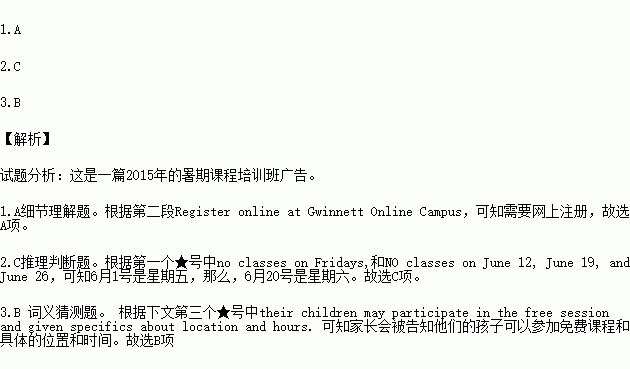题目内容
Now is a great time to start thinking about how the 2015 Summer course offerings might help you complete your academic program at a faster rate and with less money! Whether you register for Summer not, we have some great activities and other special events planned for Rowan students, faculty and staff. We hope you will join us!
Registration Information
Register online at Gwinnett Online Campus between March 16, 2015 and June l, 2015.
Class Dates
Online Summer School
June 8, 2015 to July 6, 2015
GCPS offers free Academic Summer School for qualifying elementary and middle school students in Grades 3~8.
Details
★15-day session with no classes on Fridays, (NO classes on June 12, June 19, and June 26)
First day of class is Monday, June 8, and last day is Wednesday, July l. (June 8-11: June 15-18, June 22-25, June 29-July l) '
★The dates for elementary and middle school summer school are June 8 through July l with no Summer school on Fridays (15 days).
★Parents of suitable students will be notified that their children may participate in the free session and given specifics about location and hours.
★The free academic summer school is for students who did not meet promotion criteria at their grade level.
★Summer school will not be provided at every school, due to maintenance and construction at some schools and plans for combined "cluster" summer school sites, Participating students will be told of location for summer school.
★Most summer school sites will not offer transportation. Those schools with additional federal funding to offer transportation will tell parents regarding availability.
1.If you take interest in the Summer course, .
A. you can visit its website
B. you can go to the campus
C. you can register on July l, 2015
D. you can complete a form
2.What day is June 20, 2015?
A. Thursday. B. Friday. C. Saturday. D. Sunday.
3.What close the underlined part mean in the passage?
A. Warned. B. Informed.
C. Convinced D. Worried.
 天天向上一本好卷系列答案
天天向上一本好卷系列答案 小学生10分钟应用题系列答案
小学生10分钟应用题系列答案
